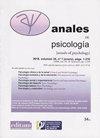Validation of the Job Crafting Scale in Latin American Workers
IF 1.4
4区 心理学
Q3 PSYCHOLOGY
引用次数: 0
Abstract
In this study, the psychometric properties of the Spanish version (Bakker et al., 2018) of the Job Crafting scale of Tims et al. (2012), was analyzed in a Latin American population. We applied the scale to a sample of 903 employees (42.6% women & 57.4% men) from Colombia and Ecuador. Reliability and validity were examined. The results of the confirmatory factor analysis showed an adequate fit both in Colombia (CFI = .916, TLI = .900, IFI = .917, RMSEA = .060) and in Ecuador (CFI = .918, TLI = .903, IFI = .919, RMSEA = .064), in the four-factor structure of the original scale. Evidence of validation, related to criterion for psychological well-being for the dimensions of increasing structural resources and increasing challenging demands, was found. The Spanish version of the scale demonstrates its usefulness for research in the Latin American context. En este estudio, se analizaron las propiedades psicométricas de la versión en español (Bakker et al., 2018) de la escala Job Crafting de Tims et al. (2012) en población latinoamericana. Aplicamos la escala a una muestra de 903 empleados (42.6% mujeres y 57.4% hombres) de Colombia y Ecuador. Se examinaron la fiabilidad y la validez. Los resultados del análisis factorial confirmatorio mostraron un ajuste adecuado tanto en Colombia (CFI = .916, TLI = .900, IFI = .917, RMSEA = .060) como en Ecuador (CFI = .918, TLI = .903, IFI = .919, RMSEA = .064), en la estructura de cuatro factores de la escala original. Se encontró evidencia de validación, relacionada con el criterio de bienestar psicológico, para las dimensiones de recursos estructurales crecientes y demandas desafiantes crecientes. La versión en español de la escala demuestra su utilidad para la investigación en el contexto latinoamericano.拉丁美洲工人工作制作量表的验证
在本研究中,在拉丁美洲人群中分析了Tims等人(2012)的西班牙语版(Bakker等人,2018)的工作制作量表的心理测量特性。我们将该量表应用于来自哥伦比亚和厄瓜多尔的903名员工样本(42.6%为女性,57.4%为男性)。检验了信度和效度。验证性因子分析结果显示,哥伦比亚(CFI = .916, TLI = .900, IFI = .917, RMSEA = .060)和厄瓜多尔(CFI = .918, TLI = .903, IFI = .919, RMSEA = .064)在原始量表的四因素结构中均具有较好的拟合性。在结构资源增加和挑战性要求增加的维度中,发现了与心理健康标准相关的验证证据。该量表的西班牙文版本表明它对拉丁美洲背景下的研究有用。En este estustudio, se analizaron las proedades psicomsamtricas de la versión En español (Bakker et al., 2018) de la escala Job Crafting de times et al. (2012) En población latinoamericana。哥伦比亚和厄瓜多尔的903名雇员(女性占42.6%,男性占57.4%)的应用。通过有效性来检验其可靠性。结果:对哥伦比亚(CFI = .916, TLI = .900, IFI = .917, RMSEA = .060)和厄瓜多尔(CFI = .918, TLI = .903, IFI = .919, RMSEA = .064)的最优因子进行了análisis因子确证,并分析了该因子的结构特征。Se encontró evidence de validación, relatiada conel criterion de bienestar psicológico, para dimensions de recursos strucstrucales creentes by demandas desafiantes creentes。La versión en español de La escala demuestra su utilitas para La investigación en el contexto latin americano。
本文章由计算机程序翻译,如有差异,请以英文原文为准。
求助全文
约1分钟内获得全文
求助全文
来源期刊

Anales De Psicologia
医学-心理学
CiteScore
3.30
自引率
5.90%
发文量
57
审稿时长
4-8 weeks
期刊介绍:
Anales de Psicologia / Annals of Psychology is a multidisciplinary journal of the various thematic areas of scientific psychology. It publishes original research articles and theoretical review in any of its basic, applied and methodological areas included within psychology.
Publishing, financing, marketing and distribution corresponds Editum: Editions of the University of Murcia (Spain). The organizational guidelines and editorial policies come from the Editorial Team (elected for four years by the Areas and / or Departments of Psychology at the University of Murcia) and the Editorial Board, composed of scholars and experts from different universities and institutions national and international. It is published in print (ISSN: 0212-9728) since 1984 and in Internet publishing (web) (ISSN: 1695-2294) since 2000. Available online full text in pdf from the vol. 1 1984.
Anales de Psicologia / Annals of Psychology maintains a system of exchange with other journals and publications of psychology in the world. Through an free exchange agreement with their respective publishers or entities responsible for editing, these journals and publications are received at the University of Murcia (Biblioteca "Luis Vives", near the Faculty of Psychology) and in return, our journal is sent to libraries and educational and research institutions such centers responsible for editing.
 求助内容:
求助内容: 应助结果提醒方式:
应助结果提醒方式:


